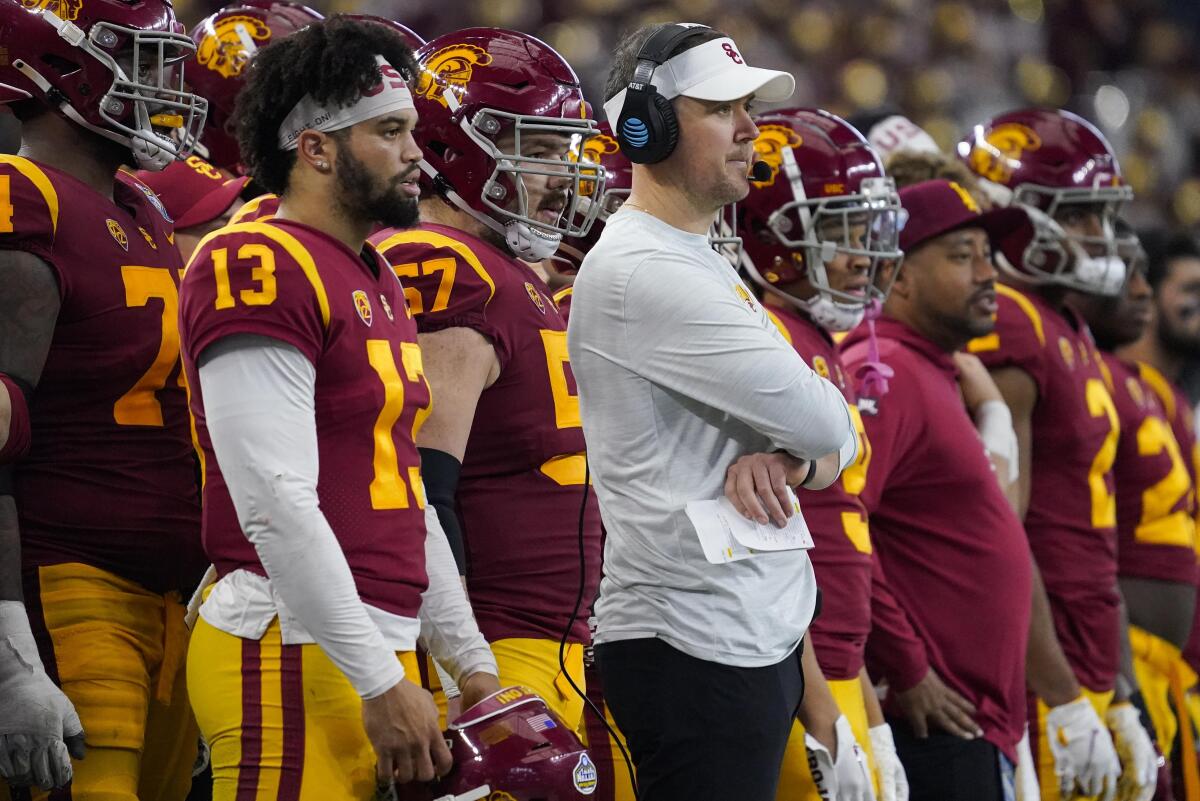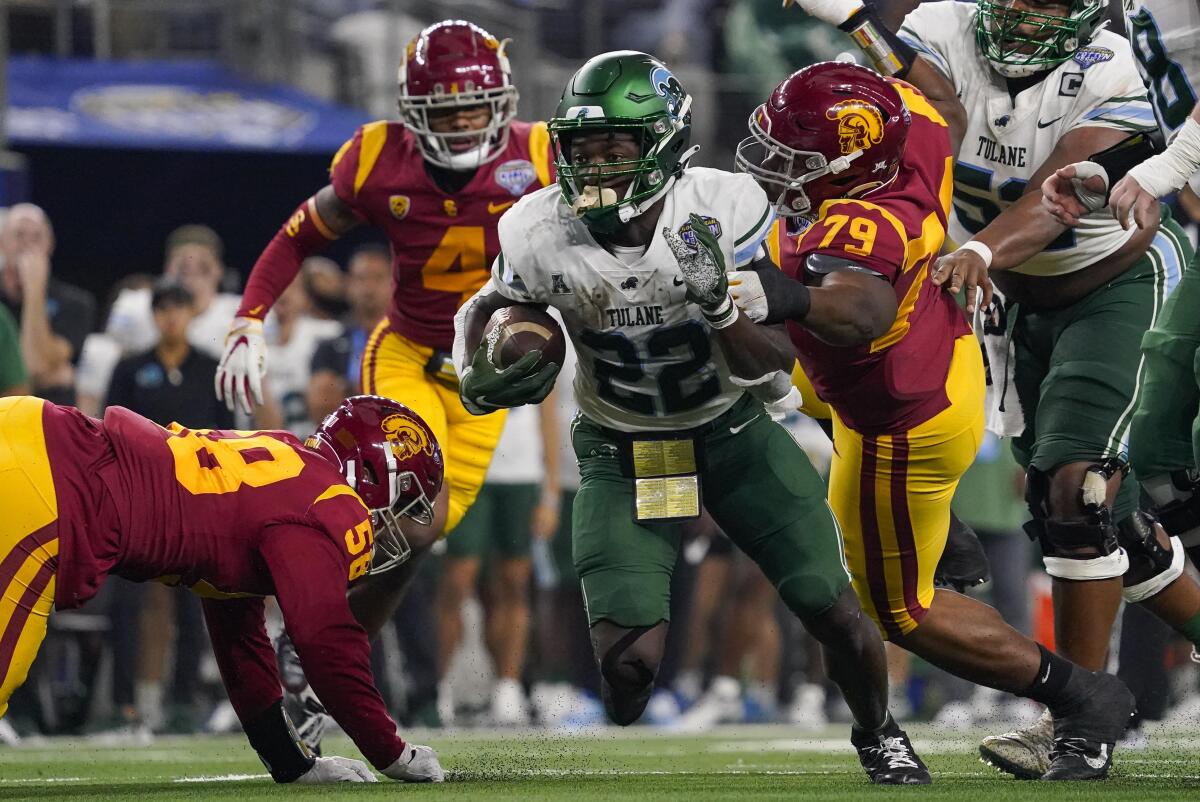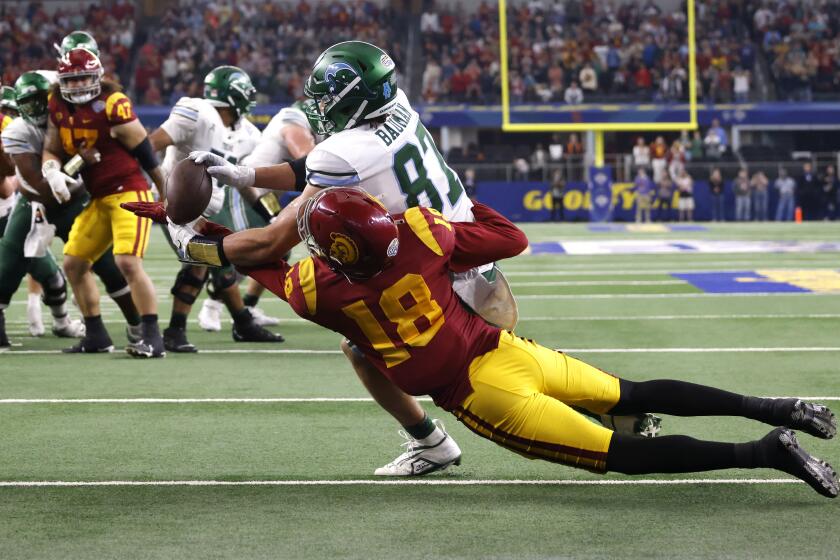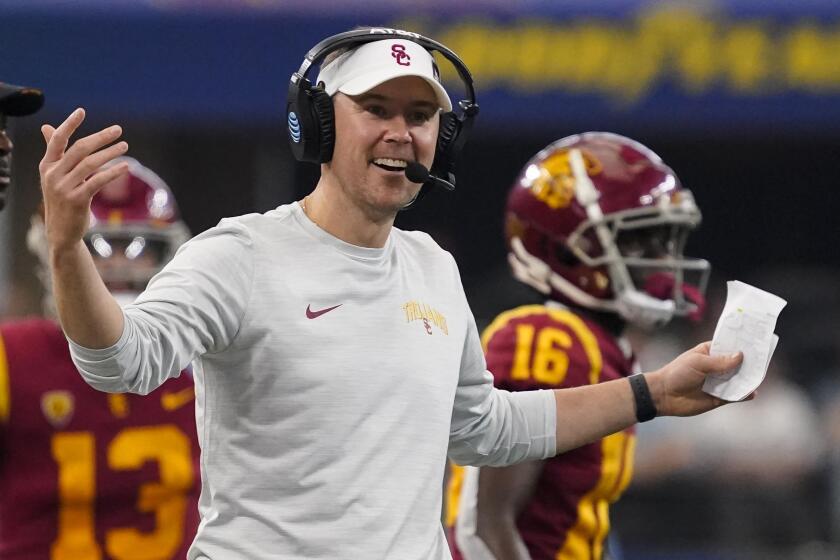Heisman winners and huge offenses won’t matter if Lincoln Riley can’t fix USC defense

- Share via
Six seasons ago, in his first year as a coach, Lincoln Riley led Oklahoma to the College Football Playoff. It was a tremendous debut by nearly every measure. With a Heisman winner at quarterback and an offense capable of outscoring any other in college football, the Sooners’ 2017 run cemented Riley as one of the premier young offensive minds.
But it also ended in dramatic disappointment, as Oklahoma’s defense came unraveled in a double-overtime defeat, allowing 54 points and 527 yards to Georgia.
In 2018, Riley again led the Sooners to the Playoff with the nation’s best offense and a Heisman winner at quarterback. And again, the defense let them down. Alabama scored 21 first-quarter points, piled up 528 yards and went on to win 45-34 en route to capturing the national title. Oklahoma went on to hire defensive coordinator Alex Grinch, hoping he might have the answer.
The next year the Sooners returned to the Playoff with Grinch’s defense — and allowed 63 points and 693 yards to Louisiana State.
Grinch followed Riley to L.A., but in their first season at USC, the same troubling pattern played out. Another dominant offense. Another Heisman-winning quarterback. Another defensive collapse.
This time, the nadir came Monday in the Cotton Bowl, as Tulane — a school that went 2-10 the previous year and hadn’t played in a “New Year’s Six” bowl game since 1939 — averaged more than 10 yards per play, rushed for more than 300 yards and erased a 15-point deficit in the final five minutes, outplaying and embarrassing the Trojans on national television.
Frustrated fans understandably focused their ire on Grinch, just like Sooners fans did before them. There’s no hiding from the fact that his defense allowed nearly 2,000 yards over USC’s final four games.
As Riley looks to the future, it’s incumbent on the coach to solve the problem that’s plagued his teams.
Caleb Williams and the USC fanbase deserve better after what unfolded in the Trojans’ 46-45 loss to Tulane in the Cotton Bowl. It all starts with Lincoln Riley.
Riley wasn’t ready for introspection Monday. Asked about his confidence in Grinch, the coach said he wouldn’t offer any “big-picture assessments” so soon after their season finale. But for the rest of Riley’s postgame news conference, that’s precisely what he did.
“I’ve rarely at the end of a year felt so conflicted,” Riley said. “On one hand, sick about the way that we finished the season. Particularly, the fourth quarter of the last two games. We lost three games this year. We lost two of them on the last play of the game. … That’s a tough pill to swallow, man. Because those opportunities are not easy to get. Now the flip side of it is, we were in those positions. And those positions are very, very real. … Twelve months ago, I don’t think many people on the outside believed that was even possible.”
Riley is right about that. This season far exceeded the hopes of USC officials and fans alike. No one disputes the Trojans’ turnaround from hapless 4-8 outfit to 11-3 title contender. No one in their right mind would deny what Riley has rebuilt in a single season, somehow bringing USC to the brink of the Playoff in the process.
“You come in here Day 1, and you’re trying, in a lot of ways, just to teach these guys how to compete and what championship habits look like,” Riley said. “You’re starting from the complete ground floor on everything. We’ve learned a lot of things. We’ve grown in a lot of ways.”
But the expectations have grown with them. And fast. That’s the deal at USC. How far the Trojans have come since firing Clay Helton and hiring Riley no longer is the focus. The window for comparisons has closed. Now it’s about how far the defense has to go in order for Riley, Caleb Williams and the Trojans to compete for a championship.

Next season, the bar will be much higher to clear.
“We didn’t come here for a one-year deal. We knew that when we signed up to come to USC,” Riley said. “This one hurts, but also, it gives complete clarity on what we need to do next.”
What that means for Grinch was anything but clear in the wake of the Cotton Bowl. But the issues on defense are so glaringly obvious that to carry on without some kind of major changes would be coaching malpractice.
It’s not as if USC simply can pluck the necessary top-tier talent from the transfer portal, either. If anything, its defense is likely to be less talented next season. USC’s top defensive player, All-American defensive lineman Tuli Tuipulotu, declared for the NFL draft Tuesday. The Trojans’ top corner, Mekhi Blackmon, already made his declaration after the Cotton Bowl. The prospect of replacing the outsized impact of either with players already on USC’s roster is probably a pipe dream.
The first season of the Lincoln Riley era at USC ended in disaster, with the Trojans giving up a 15-point lead late in a Cotton Bowl loss to Tulane.
USC has tried to be proactive in the transfer portal, adding four defensive players, including an All-Big 12 linebacker in Mason Cobb. But securing top-tier transfer talent on the defensive line and in the secondary, where the Trojans are weakest, isn’t easy. Those pursuits are better suited for the recruiting trail — yet USC hasn’t found many blue-chip defensive prospects there, either. As of this week, it has just two top-250 prospects signed to its 2023 class, according to 247 Sports.
So where is the change supposed to come from? The simplest answer is at the top. But would a new defensive coordinator or a new scheme really solve the issue?
Riley has time to think that over. But after an embarrassing finish to an otherwise stellar season, the challenge remains the same as it was six years ago, when Riley first took over at Oklahoma.
Fix the defense. Or be forever doomed to fall short.
More to Read
Fight on! Are you a true Trojans fan?
Get our Times of Troy newsletter for USC insights, news and much more.
You may occasionally receive promotional content from the Los Angeles Times.









